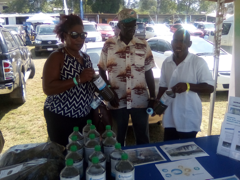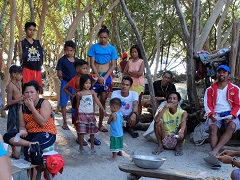
Mitchell Roffer met with Thriving Earth Project Manager Sarah Wilkins during a recent trip to speak with legislators
From Melbourne, Fla.: Science liaison Mitchell Roffer recently made a trip to Capitol Hill to discuss ways to improve the National Flood Insurance Program (NFIP). He writes: I visited Senator Rubio’s office and spoke with Wes Brooks (Legislative Assistant) on a few inter-related subjects including water quality, environmental monitoring and the NFIP. Brooks indicated that Senator Rubio is co-sponsoring a bill (S.1368) to improve the NFIP. I also visited Senator Scott’s office and spoke with Kyle Hill (Legislative Correspondent for the economy and environment), as well as Representative Posey along with his staffers George Cecala (Communications Director and Deputy Chief of Staff) and Valentina Valenta (Legislative Director). Rep. Posey said he would support bills that would improve the NFIP. Overall, I think my time was well spent. I presented a two-page summary to all in person and via email in my thank you letters after my meetings.
From Montego Bay, Jamaica: Here we are introducing our premium organic fertilizer at the recent Hague Agricultural Show. Made from the anaerobic digestion of food waste and cow manure,

The Montego Bay project team introduces their organic fertilizer at an agricultural show
our fertilizer is as an environmentally friendly alternative to synthetic fertilizer that will significantly improve soil fertility and help to build climate resilience in farming in Jamaica. A group of students from Troy High School visited our biodigester plant last week to learn about biogas technology and the natural process of recycling food waste into biogas and fertilizer. Managers from Sandals Royal and Sandals Montego Bay visited our site recently to inspect our fertilizer drying beds. We are glad for their support, and we are so pleased for the past 2+ years to be recycling and diverting food waste from eight hotels in Montego Bay from landfills.

The community gathers to hear about the process for an Environmental Impact Assessment on March 9, 2019. Image Courtesy AGHAM and AKAP KA-Manila Bay.
From Bulacan Province, Philippines: Around 700 families in the artisanal fishing community of Taliptip in Bulacan, Philippines, are in danger of displacement and livelihood loss as a 2,500-hectare aerotropolis is set to be built as part of the Philippine government’s infrastructure development program, “Build, Build, Build”. Taliptip is part of the long coast of Manila Bay, an economically important and biodiversity-critical natural harbor in the Philippines’ capital region.
Difficulties in acquiring information about the proposed aerotropolis, which would reclaim vast waterfronts, prompted the community to ask AGHAM, an organization of volunteer scientists, to assess the livelihood and cultural loss and geohazards which they may face once the aerotropolis is built.
In the initial visits of the team, volunteer geologists, community workers, and archaeologists from AGHAM and local community organizers AKAP-KA Manila Bay determined the scientific assessment needs of the community of Taliptip. One highlight of the relationship formed between the scientists and the fisherfolk residents is the participatory scientific investigation we call “Counter-EIA”. The EIA or Environmental Impact Assessment is a process which requires project proponents to thoroughly assess all beneficial and adverse impacts of a project on the concerned area. The counter-EIA, therefore, is an EIA where fisherfolk themselves become active agents in the scientific investigation and the production of knowledge through their communal and historical experiences, together with the scientists’ expertise.
Capacitating the fisherfolk of Taliptip will include training them on field methods like handling GPS devices, and interpreting hazard maps and mapping ecological resources. Ultimately, with the of AGU Thriving Earth Exchange and local scientists, we hope to equip the fisherfolk with the scientific knowledge they need so they could maximize their participation in democratic processes and help them engage in negotiations with the project proponents for their rights to livelihood and rights of residence.

Ericka Naklicki examines a soil boring in Graniteville, Staten Island. Image: Courtesy Sarah Lipuma
From Staten Island, NY: On March 23, Ericka Naklicki, Professional Wetland Scientist, conducted a preliminary wetland assessment with Gabriella Velardi Ward and Sarah Lipuma in Graniteville, Staten Island. The preliminary investigation included a walkthrough of the site to assess habitat and to collect some soil borings to obtain a general idea of soil conditions. They also observed signs of hydrology and identified dominant tree species. Ericka intends to return to the site in May or June to survey herbaceous plants and examine the soils during drier conditions. The preliminary investigation has been written into a report and will be shared with community leaders, Gabriella and Sarah, soon.
